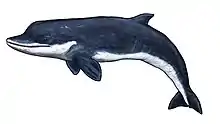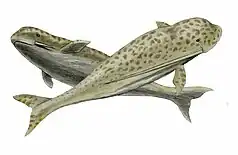Hadrodelphis
Hadrodelphis is an extinct genus of dolphin once assigned to the paraphyletic/polyphyletic family Kentriodontidae. Remains have been found in the middle Miocene (Langhian) Calvert Formation of United States.
| Hadrodelphis Temporal range: Middle Miocene, | |
|---|---|
| Scientific classification | |
| Domain: | Eukaryota |
| Kingdom: | Animalia |
| Phylum: | Chordata |
| Class: | Mammalia |
| Order: | Artiodactyla |
| Infraorder: | Cetacea |
| Family: | †Kentriodontidae |
| Genus: | †Hadrodelphis Dawson, 1996 |
Taxonomy
Harodelphis is similar to Macrokentriodon in its larger size and its large tooth diameter.[1] Despite being traditionally assigned to Kentriodontidae, recent cladistic analyses have recovered it along with Macrokentriodon in a clade with Kampholophos as sister to crown Delphinida and more derived than Kentriodon and Rudicetus.[2][3]
Hadrodelphis poseidon was described from two isolated teeth from Miocene deposits in west-central France in 1971, but its validity was questioned by Dawson (1996).[4][1]
References
- S. D. Dawson. 1996. A description of the skull and postcrania of Hadrodelphis calvertense Kellog 1966, and its position within the Kentriodontidae (Cetacea; Delphinoidea). Journal of Vertebrate Paleontology 16(1):125-134.
- Olivier Lambert, Giovanni Bianucci, Mario Urbina, Jonathan H. Geisler; A new inioid (Cetacea, Odontoceti, Delphinida) from the Miocene of Peru and the origin of modern dolphin and porpoise families. Zool J Linn Soc 2017; 179 (4): 919-946. doi: 10.1111/zoj.12479. https://academic.oup.com/zoolinnean/article/179/4/919/3076080/A-new-inioid-Cetacea-Odontoceti-Delphinida-from?guestAccessKey=3b956b95-d215-488a-8d90-1cff59554290#63703008
- Post K, Louwye S, Lambert O. (2017) Scaldiporia vandokkumi, a new pontoporiid (Mammalia, Cetacea, Odontoceti) from the Late Miocene to earliest Pliocene of the Westerschelde estuary (The Netherlands) PeerJ 5:e3991 https://doi.org/10.7717/peerj.3991
- GINSBURG, L. & JANVIER, P., 1971: Les mammifères marins des faluns miocènes de la Touraine et de l’Anjou.-Bull. Mus. Nat. d’Hist. Nat., Sci. de la Terre, 6(22): 161-195.
This article is issued from Wikipedia. The text is licensed under Creative Commons - Attribution - Sharealike. Additional terms may apply for the media files.

